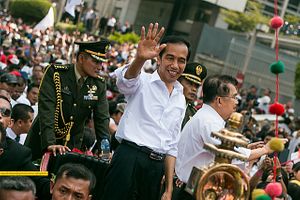The election of Jakarta Governor Anies Rasyid Baswedan and the imprisonment of the former governor Basuki Tjahaja Purnama, known popularly as Ahok, on blasphemy charges, marked a stark turning point for Indonesian politics and Indonesian society.
The ISEAS Yusof Ishak Institute saw that 58 percent of respondents in a September 2017 survey thought it was “very important to choose a Muslim leader” and around half of those surveyed also believed that “the government should prioritize Islam over other religions.” These popularly held opinions demonstrate that the mainstream political landscape in Indonesia is shifting toward a more religiously conservative norm. These norms have been building in recent times with the passing of the halal law under the previous administration of President Susilo Bambang Yudhoyono. The rise of Islamic conservatism is not a short-lived phenomenon but has been growing over recent years in Indonesia.
The current president, Joko Widodo, popularly known as Jokowi, is also not immune to this changing tide and the rise (and rising influence of) Islamic conservative groups. A recent CSIS poll from September puts Indonesians satisfaction with his performance at 68.5 percent, whilst his electability stands at a more testing 51 percent. His reluctance to be drawn into a more religiously conservative style of politics may well be good for Indonesian democracy and the preservation of plurality, but risks his chance at the polls. Jokowi has frequently made it clear that politics and religion should not be mixed and should be seen separately, but as the Jakarta election saw, mixing the two does play well come election day. This is a warning of may what come for the next presidential election in 2019.
The rise of Islamic conservatism marks a key challenge for Indonesia and Jokowi. Due to the success of a religiously-driven campaign, opposition forces are now mobilizing religious groups against him. The politics of identity is now at play. For Jokowi and his political team, this has not gone unnoticed and a fight back against intolerance and radical conservatism can be seen in policies such as invoking the national ideology of Pancasila as a counterweight, disbanding hardline Islamist group Hizbut Tahrir, charging firebrand Islamist FPI leader Rizieq Shihab, clamping down on fake news – for example that he is a secret Christian — and actively reaching out to moderate Muslim organizations.
Politics, however, continue to push Indonesia towards Islamic conservatism. Vice President Jusuf Kalla is on record as stating that inequality is driven by religion – a nod to the notion that the rich elite in Indonesia is mostly Chinese-Indonesian Christian. Leaders of influential Muslim groups have also spoken of foreigners as a bad influence on Indonesia and that Indonesia’s economy should not be dominated by foreign companies and or Chinese-Indonesian Christians.
The consequence for Indonesia is that this movement limits the country’s ability to reach higher growth rates. It makes it much harder politically for the Indonesian government to be seen to be opening up the economy to foreign investment. At the same time, domestic politics is now dominating the president’s agenda, distracting him from a focus on continuing to reform and open-up the economy.
Economic nationalism continues and is in many ways renewed, especially over natural resources such as in the mining and oil and gas sector. In the mining sector, U.S. mining giant Newmont was sold to a local Indonesian consortium. U.S. miner Freeport is also now complying with the Indonesian government’s demands by agreeing to set up a smelter in the country and divest its majority stake in Indonesian operations toward Indonesian interests. Both foreign mining giants have now fallen victim to the rise of resource nationalism. The oil and gas sector has also experienced the same rise, with previously foreign-owned assets been taken over by local Indonesian state-owned Pertamina.
What this all means for Indonesia is slower growth, less prosperity, and therefore less economic tools to tackle inequality, which in large part is a driving factor of the resentment and increased Islamic conservatism and economic nationalism that has been seen. In this environment, foreign players will increasingly face pressure in a political environment dominated by Islamic conservatism and renewed economic nationalism. Despite reformist policies from Jokowi’s economic team, foreign players may not find it so easy in the years running up to the next election, as politicians increasingly play politics with these two disparate but connected forces that are now gripping Indonesia.
Edward Parker is a contributor to The Diplomat, based in Southeast Asia.

































